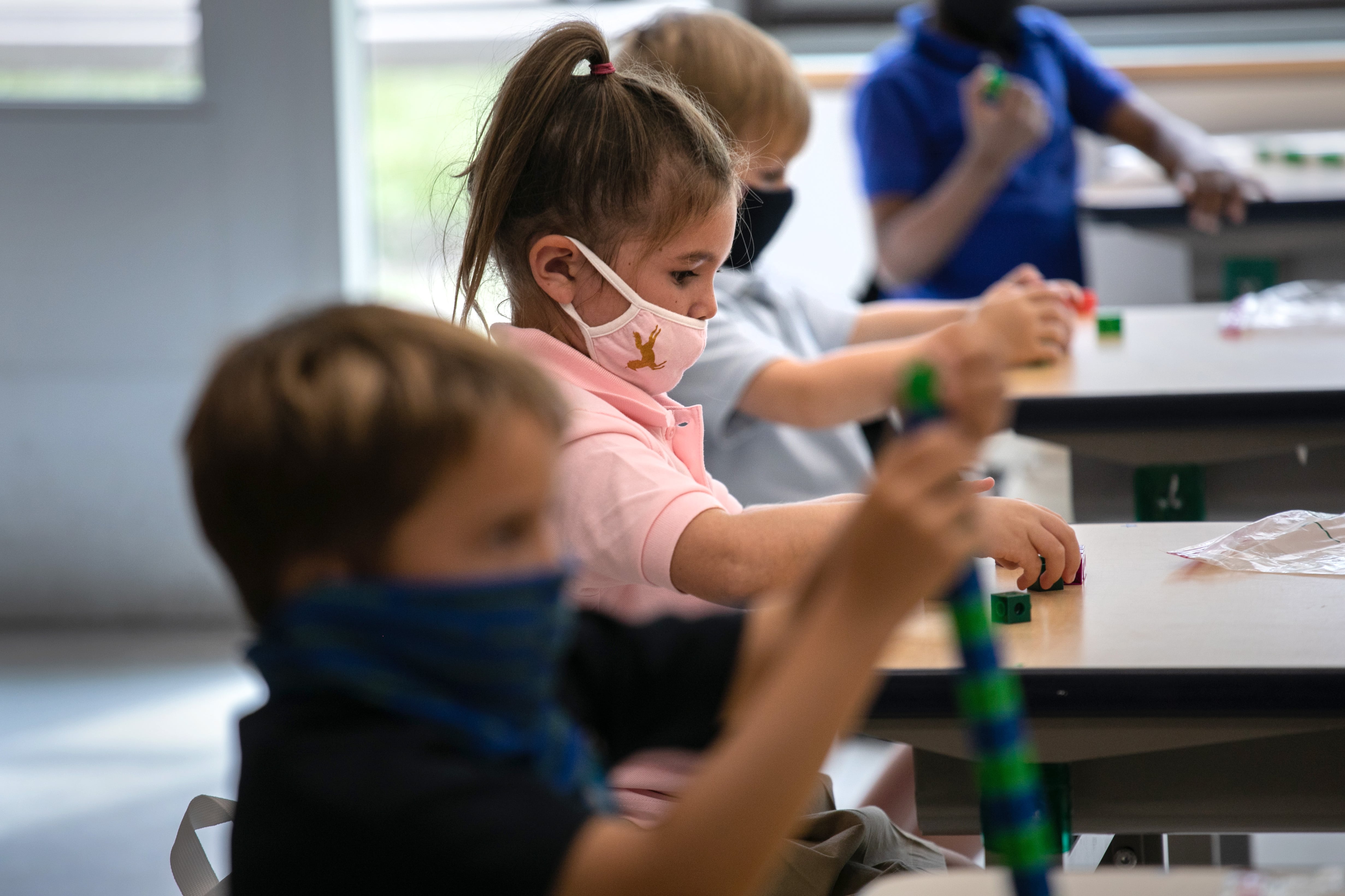In Broward County, Florida, school officials noticed something worrying this month.
Schools were back in session, virtually. But a few weeks in, one group of students was missing in large numbers: kindergartners.
At Deerfield Beach Elementary, where 81% of students come from low-income families, there are 52 fewer kindergarten students than there were last fall. Twenty miles south, Harbordale Elementary, where 40% of students are from low-income families, was down 38.
“We were definitely concerned,” said John Sullivan, who oversees the district’s enrollment planning.
Some declines were projected, due to factors like lower birth rates. But this was something different. All told, the district’s traditional public schools are serving 2,000 fewer kindergarten students — a decline of around 14%.
School districts are seeing similar double-digit declines across the country, from Oakland, California to Philadelphia. Kindergarten enrollment is down 15% from last fall in Hawaii’s schools, according to state data. In Los Angeles, it’s down 14%. And in Gwinnett County, Georgia, where in-person classes have resumed, it’s down 10% since last fall, state and district figures show.
The trend seems to cut across income lines, with declines in schools that serve mostly students from low-income families as well as wealthier ones. When the Education Week Research Center surveyed some 400 school district administrators and principals in late August, more than half reported seeing a decline in kindergarten enrollment — and the pattern was similar for high-poverty and more affluent school districts.
What that means for students depends on where they end up instead, which could be another type of school or child care. This year, there’s no guarantee that the virtual kindergarten some districts are offering will provide the usual academic benefits, either. But some worry that the enrollment declines mean more young students will go without the academic and other benefits of kindergarten — and that could deepen existing educational inequities.
“It all has to do with the quality of that care setting,” said Elizabeth Votruba-Drzal, a University of Pittsburgh professor who studies child care and early education. “Affluent parents can buy their way into high-quality settings, regardless of the constraints that they face, whereas families that have fewer resources have fewer choices and face very tough decisions.”
The nationwide declines in kindergarten enrollment, school officials and education experts agree, emerge from how the pandemic has upended schooling, especially for young children.
In some parts of the country, school remains virtual. Young children have a hard time paying attention to the screen for long periods, need help navigating educational apps or websites, and require lots of hands-on supervision, which can make online learning frustrating or impossible, especially for working parents.
Jennifer Levi, who lives in Broward County, was hoping to avoid all of that this fall after her 5-year-old daughter struggled with virtual preschool in the spring.
“We’re a two working-parent household, so we’re very busy all day with our own work,” Levi said. “They’re supposed to learn to read. They need a lot of getting up, and interaction, and small groups, and the use of manipulatives to learn, and all of that isn’t possible on a computer screen.”
So despite wanting to send her daughter to the local public elementary school, when it became clear that it would start the school year online, she enrolled her daughter in a nearby charter school, hoping that it would open for in-person instruction sooner.
That didn’t end up happening — the charter school started the school year virtually, too. But for now, Levi’s been impressed by how her daughter’s teacher has delivered instruction over Zoom, so they’re sticking with it.
“Do I think it’s equivalent to an in-person instruction? Absolutely not,” Levi said. “It’s the best that it could be considering the circumstances.”
In places where kindergarten is happening in person, some parents are opting not to send their children because they worry about how the mask-wearing and social-distancing rules will affect their young kids.
Tamera Knight saw that happen at the family child care business she runs from her home in Lawrenceville, Georgia. One of the children she’s cared for since he was a baby is now 5, but his parents chose not to enroll him in kindergarten, even when Gwinnett County schools started offering in-person classes.
“His mom and dad did not want him going into the school system having to wear a mask, and be socially distanced from a teacher,” Knight said. “They said: ‘This is not what we want his first experience with school to be.’” She’s now helping the 5-year-old get ready for first grade, with a focus on reading skills, while caring for a handful of other children.
Some child care centers, daycares, preschools, and other providers have expanded their services during the pandemic to accommodate children old enough for kindergarten.
That option is less accessible to low-income parents, since it means trading something that would usually be free — public kindergarten — for something that costs money. In Knight’s case, full-time care costs $200 a week. In the Detroit area, many parents are struggling to pay out of pocket, since state subsidies for child care don’t apply for school-age kids.
Odile Mendez, an outreach center manager at the Latin American Association, a Georgia nonprofit that serves low-income Latino families, said many parents she works with in Gwinnett County are still afraid to send their children to in-person school and have also struggled to afford additional child care.
“The ones that are still working, they usually rely on family members or neighbors to take care of their children, or if they have a kid who’s 16 years old, to take care of the ones that are 5 or 4,” she said.
It’s also possible that kindergarten students ended up in private schools or are opting for a formal homeschooling setup. Enrollment data making those shifts clear won’t be available for some time, and some states do not track it.
In Broward County, district officials say it’s especially hard to know where would-be kindergartners ended up, since kindergarten would have been their entry into the district and its data systems.
“If we never got them, we can’t find them,” said Jill Young, who directs the district’s demographics and enrollment planning department.
There’s also the fact that while the vast majority of children eligible for kindergarten usually go, attendance isn’t required in most states, including Florida, which could encourage some families to sit it out this year.
The shift could also have sweeping financial consequences for school districts. Because funding is often tied to enrollment, if students don’t show up, schools lose money and may have to lay off staff. (Some states may offer an out, though it could be short-lived: Florida, for example, has said it won’t financially penalize schools for enrollment declines this fall. Talks about whether to extend that are ongoing.)
Now, the big question is whether young students who sat out virtual kindergarten will return when in-person classes do.
That’s the hope in Broward County, where the school board discussed the district’s proposal to reopen for younger students first at a meeting Tuesday. In Gwinnett County, Georgia, kindergarten enrollment did inch up some after the district reopened its physical doors. About 1,000 more kindergartners showed up between mid-August, when kindergarten was still remote, and mid-September, an increase of a little over 10%.
Still, the numbers are lower than the district projected. District officials chalk it up to a combination of factors: the pandemic interrupting kindergarten enrollment events this spring, Georgia not requiring kindergarten, and parents who “may have looked for other options,” spokesperson Sloan Roach said.
Levi, in Broward County, is planning to keep her daughter at the charter school. The real dilemma, she says, is whether to revert to the family’s original plan, their local district elementary school, next year.
“It’s definitely a tough call,” she said. “That’s the question of the hour.”






